Mary Anne Yarde's Blog: The Coffee Pot Book Club , page 147
March 22, 2019
Join Historical Fiction author, Chris Formant, as he takes a minute to reflect on the last two weeks since his fabulous book Saving Washington hit the shelves.
Saving Washington — the last two weeks!
By Chris Formant

It’s been less than 2 weeks since the release of Saving Washington. A whirlwind of TV, radio, interviews and book events, including a well attended one at the 92 Street Y in NYC. Culminating in the announcement that one of HBO’s top producers (Big Little Lies, Deadwood) optioned the story for a possible mini-series, and having the dramatic book cover splashed on the large video screens on Times Square. All very heady stuff for my second book.
But, when I sat down to write this blog, those things aren’t the ones that had the biggest impact on me.
I wrote Saving Washington because I wanted to bring light to an event that had been virtually lost in history. One that saved our young country from certain disaster just 6 weeks after the signing of the Declaration of Independence.
At every event and also directly contacting me via my website or social media, I have struck a chord with a diverse range of followers. The Sons of the American Revolution, American Legion, historical societies, re-enactor groups all reached out. I had expected that.
What was unexpected was the reaction of teachers, kids from 7 years to college age, and African-American organizations. All were shocked to learn of the forgotten story of ‘America’s 400 Spartans” and that not only were black patriots part of the Continental Army, but that the Revolutionary War had the most integrated combat force until the Korean War.
What it underscored for me was the value of historical fiction’s role in bringing to life America’s past and the importance of making it relevant to more than just history junkies.
It also underscored how emotionally touched many readers have been re-living the purity of heart and the bravery of the young men from Maryland.
Personally, I think the diverse reaction comes from America’s hunger for the type of true heroes that forged the young United States. The kind that people look up to. Try to emulate. That inspire them. That find ways of including not excluding.
I heard recently that many middle schools don’t even begin American History education until the Civil War, I was flabbergasted. Imagine the same kids who know every word of Hamilton, not being taught about the founding of our country.
But it also made me proud that in a small way, Saving Washington can help bring heroes to our children but also remind us older kids what real patriots are.
“Guard against the impostures of pretended patriotism…”George Washington
Saving Washington
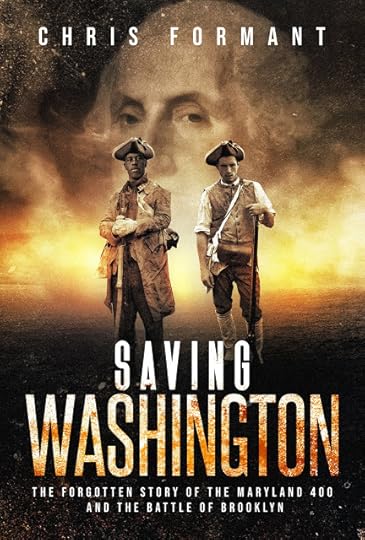
The lost story of “America’s 400 Spartans”—an army of unexpected heroes who changed the course of history.
On a marshy Brooklyn battlefield on August 27, 1776, four hundred men from Baltimore, Maryland assembled to do battle against a vastly superior British army. Seemingly overnight, these young soldiers had matured from naïve teenagers to perhaps the most important, yet most forgotten, citizen soldiers in all of American history: “America’s 400 Spartans.”
Saving Washington follows young Joshua Bolton and his childhood friend Ben, a freed black man, as they witness British tyranny firsthand, become enraptured by the cause, and ultimately enlist to defend their new nation in a battle that galvanized the American nation on the eve of its birth.
Chris Formant’s gripping tale blends real-life historical figures and events with richly developed fictional characters in a multi-dimensional world of intrigue, romance, comradeship, and sacrifice, transporting us two-and-a-half centuries back in time to the bustling streets of Baltimore and the bloody, smoke-filled carnage of battle in Brooklyn.
Excerpt
Courtesy of Permuted Press.
After the wake, she returned to her bedroom and shuttered the blinds. She lay back down and allowed the days to pass, not distinguishing morning from evening. She didn’t eat—she had no appetite whatsoever—only she did have a blurred recollection of Lydia coming and going with tea, which she had cajoled her into sipping.
“Why Sam…why?”
“Mary?” Lydia asked.
Mary didn’t realize she had uttered the words aloud and wasn’t aware of Lydia’s presence in her bedroom. She had no idea how long she had been hovering over her. “What do you want?” she snapped.
“It’s time,” Lydia answered, flinging open the blinds. The room instantly flooded with morning sunlight.
Mary, frozen on her bed, shielded her eyes with her arm.
Lydia had never seen her in such poor condition: She looked frayed and fragile, already shedding pounds from lack of sustenance. “Let me give you a hand…”
Lydia wasn’t about to give her any say in the matter. She took Mary by both hands and coaxed her into sitting up and then onto her feet. Lydia hardened her grip to help Mary as she waivered. Mary’s face flushed. “You all right?”
“A bit dizzy…but I’ll be all right,” Mary said, steadying herself on her own.
“We’d better get a move on; we’re a bit late,” Lydia said. “There’s quite a fuss out there already.”
Lydia helped Mary undress and hoist on an all-black dress with an embroidered matching shawl. She adjusted the silver brooch on Mary’s chest and then reached for a brush on the nightstand. Mary plucked the brush out of her friend’s hand. “No—I can brush my own hair, thank you very much.”
“Ah, good,” Lydia remarked, stepping back. “Returning to your wonderful old curmudgeon self, I see.”
Mary brushed out her knotted hair, wrapped it into a bun, and pinned it all together. Her color and strength were somehow returning to her all on their own.
“What are you going to say?” Lydia asked, handing her an appropriate black hat and thickly netted veil.
“I suppose I’ll know when I step out there,” she replied.
After a bit more primping, Mary announced, “Ready.”
They made their way through the house, opened the door, and paused together in the doorway, astonished at the sight in front of them: A stream of mourners dressed in black had gathered to pay their respects. Seeing Mary, they all began to remove their hats, out of respect. Further down the street, patriot supporters seethed with pent-up rage as they held protest signs and flags at their sides.
Mary felt her eyes become misty and gulped back tears. She was thankful to have the veil as a shield.
“Sam’s death has changed everything,” Lydia said, her voice quivering.
Mary smoothed the wrinkles in her dress with her hands and stepped forward into the mass of townspeople—whites and Negroes, men and women, merchants and dockworkers, city dwellers and local aristocrats in their finery—clapping in her honor. The reactions became deafening, engulfing her tiny frame.
When she reached the center of the crowd, she held up her pale hand and everyone fell silent. “Thank you all…for gathering here today,” she sputtered. “Sam…would have been honored by your presence.”
The crowd cheered. Mary could hardly believe that all of this fuss was for her husband, a reserved man who didn’t particularly enjoy being the center of attention.
“I was informed that my husband was killed four days ago…a senseless act of cowardice,” she said under her breath. “I have been trying to come to terms with it…to understand why. To know why the Lord would claim my husband…and why He did so in such a brutal manner. Sam was a moderate, religious, and peaceful man. He never harmed a soul…. He deserved nothing but honor and respect.”
Her surrounding audience responded with applause, but she would have none of it. She raised both hands and quieted them down with a voice that was unexpectedly strong and unbroken. “But that is not really the entire reason why you are all here, is it? It took me a long time—far too long—to realize that a terrible evil has infiltrated our land. They tax us with impunity. They force our businesses into debt. They march troops through our cities to the north. They treat us as if we are not worthy of their citizenship. Now they murder us in cold blood when we speak our minds. I say, ‘No more!’ There comes a time when even the lambs must fight against the wolves. I believe with all of my heart and with all my soul that the Lord is on the side of the lambs. We are the chosen ones who will be delivered!”
The claps, whistles, and cries surrounded her with such force that she once again became unsteady. She could hardly believe such rebellious words had come from her lips. But she was not finished…not yet. When the crowd simmered down, she continued, “I know many people in our colonies remain loyal to the Crown. Until this week, I too had doubts about our cause. But I say to you now: Any sovereign who would tax, pillage, and murder his own subjects does not deserve our loyalty. We are God’s children, not the king’s!”
She gazed downward, exhausted. The crowd roared out of control, chanting and cheering. Lydia held her shoulders for support—and to assure her of how well she had spoken.“That was the most inspiring speech I’ve ever heard in my life,” a patriot said to her.“Bless you, Mary, bless you,” sobbed one of her female neighbors.
Greenwood, with his arm in a sling and his eyes wet with tears, somehow found his way to her for an embrace. “You do a great honor to Sam…and all of us.”
She heard a familiar voice from behind. “Mother…I’m speechless.”
Before this tragedy had occurred, Mary had ruminated over the lecture she would give her son the next time she saw him: a harsh combination of inducing guilt and scolding him for having treated his own mother and father with such disrespect. But now that Josh stood right there in front of her—his boyish face smeared with tears—she helplessly fell into his arms and wept.
Pick up your copy of Saving Washington today!
Amazon UK • Amazon US • B&N
Chris Formant
 Novelist Chris Formant is a student of history. He’s a former top executive of a multi-billion-dollar global business and now technology company CEO. Formant is an unlikely author of historical fiction, but the heroic story of Maryland’s Forgotten 400 drove him to assemble an expert team to help him conduct painstaking research and then write his highly anticipated second book, SAVING WASHINGTON.
Novelist Chris Formant is a student of history. He’s a former top executive of a multi-billion-dollar global business and now technology company CEO. Formant is an unlikely author of historical fiction, but the heroic story of Maryland’s Forgotten 400 drove him to assemble an expert team to help him conduct painstaking research and then write his highly anticipated second book, SAVING WASHINGTON.His debut novel, Bright Midnight, received lavish praise and has been dubbed the “Da Vinci Code for rock and roll fans.” In the thriller, Formant created a unique mystery in which he re-imagined the deaths of rock icons as murders. Chris divides his time between Baltimore, Maryland and Sedona, Arizona.
Connect with Chris: Website • Facebook • Twitter • Linkedin
Published on March 22, 2019 00:00
Historical Fiction author, Patricia J. Boomsma is sharing an excerpt of her fabulous book — The Way of Glory. Patricia is also giving away a copy of The Way Of Glory #Giveaway #HistoricalFiction@hfvbt
Historical Fiction Virtual Blog Tours Presents…

The Way of GloryBy Patricia J. Boomsma
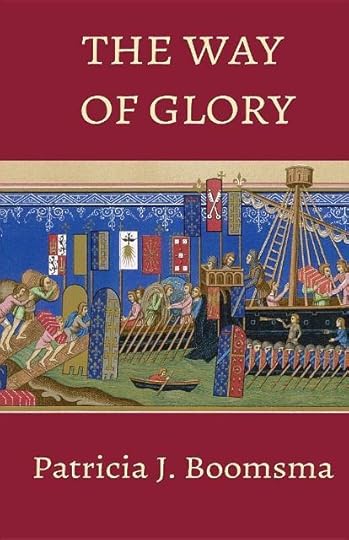
Cate, a teenage girl from twelfth century England, joins her brothers and aunt on a crusade to save Jerusalem that stops in Hispania to battle the Moors. Life on a battlefield strains the family’s closeness as they confront the terror and contradictions of holy war. Cate’s dreams of sainthood change to those of a husband and children when she falls in love with a soldier, but she finds no peace even after the family settles on land taken from the Moors. Cate’s friendship with a conquered Moor soon leads to impossible choices as she faces the cost of betrayal and the loss of all she’s known.
Praise for The Way of Glory
“One of the many impressive things about The Way of Glory is how lightly it wears its scrupulous research. This fine novel invites you to lose yourself to the compelling character and tumultuous life of a young woman trying to find God and love at the heart of a crusade rooted in greed and hate. This is a remarkable debut by a writer to watch.”
Naeem Murr, author of The Perfect Man
“The Way of Glory convincingly portrays a place, a time, and a people vastly different from our own. Historical fiction is a fantastically difficult genre to get right, but Pat Boomsma manages it with aplomb.”
Pinckney Benedict, author of Dogs of God
Excerpt
Galan’s HouseLent 1147
Stars still shone as the dawn began to lighten the edges of the clouds when Willard trudged toward Galan’s house. The only sounds were of birds gathering in the trees and Willard’s feet cracking the thin skin of ice over puddles in the street. He dreaded this part of a priest’s job, sitting with families grieving over their dead. And this time it was Oxa, a young child, an only son!
As he neared the house, Willard put on his compassionate face. He was sympathetic, but angry too. Outraged. He knocked softly, and Father Simon greeted him with a sad smile then left.
Acha slouched near the smoldering fire, handing Galan a bowl of pottage. She silently offered Willard a trencher. He shook his head, then kissed then marked the sign of the cross on Oxa’s forehead. He knew he shouldn’t stare, but couldn’t stop himself, seeing the blues and blacks and yellows along Oxa’s cheek. He wanted to check Oxa’s hands and feet but decided to ask Father Simon instead. This family had seen enough. Willard moved slowly toward the bench along the open window, pulling his hood up against the wind. It was going to be a long, sad day.
Galan left quickly, mumbling “work to do” in Willard’s direction. Acha dropped onto the bench, shoulders hunched forward.
“Sleep, Acha,” Willard said, taking her hand. “I can watch alone, and there will be neighbors coming soon.”
Willard could see her stubbornness battling her exhaustion as she looked up at him. Then she nodded and lay down on a pallet as far away from the body as possible. Willard could tell she wasn’t sleeping but was glad not to have to make conversation. What is there to say?he thought. That Oxa looks peaceful? He does not. That he is in a better place? True, but she would hear that too much in the next few days. That this wrong will be avenged? Willard feared it wouldn’t, at least not in this life.
Willard’s thoughts drifted as he sat in the stillness. He wondered how Cate was handling all this. What good were soldiers on the walls if they couldn’t tell when someone dumped a body? Lazy, useless Normans. Cate was inconsolable last night in her muddy clothes, her eyes shining with tears. It was all he could do to maintain his priestly reserve and direct his sympathy toward Acha instead of holding his sister close in his arms. She seemed very young then, young and sad and confused.
Was it just yesterday morning Cearl was teasing Cate about getting married? Willard stifled a sigh. Families. He knew Cearl’s mockery hurt Cate more than she let on. Why didn’t Cearl see it and leave her alone? Willard had seen the tears forming in her eyes as her parents discussed her marriage prospects. Cate had told him more than once she’d rather live in a convent than marry. Was that fear or religious feeling? He guessed a little of both. He knew from watching Cate with Sperleng’s friends that she was not immune to the attractions of men. But she also loved the stories of saints and fervently prayed on holy days. Not that their parents could afford to buy her a place. But how could he dismiss her desire for a religious life when he’d lived with similar dreams?
Willard knew Cate was more like him than the rest of their practical family. He often wondered when he watched his huge, strong brothers if he’d been a foundling, dropped off at their door one winter night. He knew they loved him, but sometimes it felt like the love of an adult for an infant or a stray kitten. The protectiveness of the strong for the weak.
He had tried to find humor in men’s comments about the local midwife’s voluptuousness and the sights she has seen but could not. He preferred Father Simon’s stories about Jesus’s travels with his disciples, the prophets, St. Augustine. But he never should have told Cate the stories of female saints or of holy women who refused marriage like Christina of Markyate. It had filled her head with impossible dreams.
And who could tell if a sister was beautiful, attractive to men who might want to marry her? He guessed she was pretty in her own way, taller than most girls, with light brown braids that blanched in the sun. He just loved her. Cate had the energy and joy of a child, but was responsible too, cleaning scraped knees and herding back a wandering child. He’d often seen her in the lanes surrounded by children grabbing her skirts and demanding kisses. Oxa had been especially attentive to her, running whenever he saw her, hugging her leg and handing her rocks to throw for a game or wanting to hear her tell a story. Willard guessed Oxa found Cate’s quick smile and hugs a welcome change from the quiet stiffness of his mother. Willard shook his head and glanced toward Acha. Some women just didn’t seem to know what children needed from them.
Willard got up and looked again at Oxa’s face, checking to see if by some miracle he breathed again. Wouldn’t that be glorious? But he saw nothing and walked to the window, barely noticing the smoke lifting from nearby houses. Oxa had been a fine boy, always interested in Willard’s stories about the saints. He was likely in heaven already. Willard wondered what Oxa’s life would have been like had he lived. Would he have been pious and silent like his mother? A generous drunkard like his father? So many expectations were put on an only child. Willard brushed a tear from his face.
A loud knock roused him from his reverie. “Acha,” he said softly, “They’ve come.”
Giveaway
During the Blog Tour, we will be giving away a paperback copy of The Way of Glory Enter:HERE!Giveaway Rules
• Giveaway ends at 11:59 pm EST on March 19th. You must be 18 or older to enter.• Giveaway is open to the US & Canada only.• Only one entry per household.• All giveaway entrants agree to be honest and not cheat the systems; any suspicion of fraud is decided upon by blog/site owner and the sponsor, and entrants may be disqualified at our discretion.• The winner has 48 hours to claim prize or new winner is chosen.
Pick up your copy of The Way of Glory
AMAZON BARNES AND NOBLE INDIEBOUND
Patricia J. Boomsma
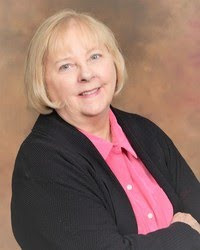 I grew up in a far southwestern suburb of Chicago among the trees and sloughs of the Cook County Park District, then attended college in Michigan. After graduating, I dreamed of an academic life teaching English literature and began a Ph.D. program at Purdue University. There I concentrated on medieval studies, receiving a Master’s and continuing on for four more years before realizing that no one I knew was finding a permanent, let alone tenure-track, position. So, instead of writing my dissertation I went to law school. I moved to Arizona to escape the brutal midwestern winters and have been practicing law there for over thirty years. My first novel, The Way of Glory, is, in part, an extension of my love for all things medieval.
I grew up in a far southwestern suburb of Chicago among the trees and sloughs of the Cook County Park District, then attended college in Michigan. After graduating, I dreamed of an academic life teaching English literature and began a Ph.D. program at Purdue University. There I concentrated on medieval studies, receiving a Master’s and continuing on for four more years before realizing that no one I knew was finding a permanent, let alone tenure-track, position. So, instead of writing my dissertation I went to law school. I moved to Arizona to escape the brutal midwestern winters and have been practicing law there for over thirty years. My first novel, The Way of Glory, is, in part, an extension of my love for all things medieval.WEBSITE • FACEBOOK • TWITTER • GOODREADS
Published on March 22, 2019 00:00
March 21, 2019
Have you heard? #HistoricalFiction author, Jayne Davis, has a fabulous #NewRelease out — Sauce for the Gander @jaynedavis142
Sauce for the GanderBy Jayne Davis
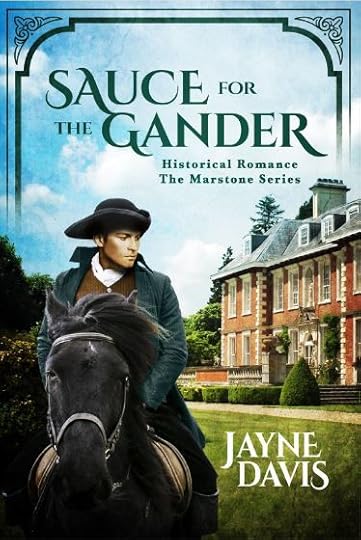
A duel. An ultimatum. An arranged marriage.England, 1777Will, Viscount Wingrave, whiles away his time gambling and bedding married women, thwarted in his wish to serve his country by his controlling father.News that his errant son has fought a duel with a jealous husband is the last straw for the Earl of Marstone. He decrees that Will must marry. The earl’s eye lights upon Connie Charters, unpaid housekeeper and drudge for a poor but socially ambitious father who cares only for the advantage her marriage could bring him.Will and Connie meet for the first time at the altar. But Connie wants a husband who will love and respect her, not a womaniser and a gambler.Their new home, on the wild coast of Devonshire, conceals dangerous secrets that threaten them and the nation. Can Will and Connie overcome the forces against them and forge a happy life together?
Amazon
ExcerptLate that afternoon Connie was summoned once more to the study, where the lowering sun slanted a pink light through the windows. Her father sat behind his desk, a small pile of papers before him and a rare expression of satisfaction on his face. “Sit down, Constance. I have good news for you.”That sounded ominous.“You are about to improve your situation in the world. Lord Marstone came today to agree your marriage arrangements.”Connie stared at him. “Marriage?” To the fat old man with a gouty foot?No.“Yes, yes. Marriage!” His complacent smirk faded. “You should be thanking me. That is what all young women should aspire to, marrying well.”Nausea rose in her throat. “Papa, he’s old enough to be—” She bit her lip against her words, and against rising panic. He was old enough to be her father, yes, but Charters wouldn’t see that as an impediment.“Ha! No, girl. The marriage is to his son. I’ll have a viscountess for a daughter, a countess one day.”The son who fights duels over loose women? She closed her eyes for a moment—that could be worse.“But Papa, I have never even seen him!” “What difference does that make? It’s all arranged, you ungrateful girl.” He tapped the papers on his desk. “The contract is signed and witnessed, and irrevocable. You will be married at Eversham on Monday, at eleven…”Three days?Her father talked on, his tone gloating, but she was no longer listening. Was she even to meet her future husband before the ceremony? Was it truly irrevocable? What if she told her father—no, told the earl—some fiction about a lover, that she was no longer—“Constance!”She started as her father’s hand slammed onto the desk. His smile was completely gone now, a vein bulging in one temple.“Some gratitude would be fitting,” he spat. “It’s a better match than you could ever have hoped to make. Get your things packed up, and make sure you don’t disgrace me on Monday. Now get out of my sight!”Tears pricking her eyes, Connie got to her feet and left the room. In the hallway she hesitated, clenching her hands into fists so that her nails dug into her palms. She’d be alone in her room, but that wasn’t what she needed—instead, she turned the other way and strode out of the house, out of the gate and across the fields.***
Another excerpt from Chapter 1, can be read at the end of my post on Duelling and its place in history. Read the excerpt HERE!
Jayne Davis
 Jayne Davis writes historical romances set in the lateGeorgian/Regency era, published as both ebooks and paperbacks.
Jayne Davis writes historical romances set in the lateGeorgian/Regency era, published as both ebooks and paperbacks.She was hooked on Jane Austen and Georgette Heyer as a teenager, and longed to write similar novels herself. Real life intervened, and she had several careers, including as a non-fiction author under another name. That wasn't quite the writing career she had in mind...
Finally, she got around to polishing up stories written for her own amusement in long winter evenings, and became the kind of author she’d dreamed of in her teens. She is now working on the first few books in the Marstone Series, set in the late Georgian/early Regency period.
Connect with Jayne: Website• Facebook • Pinterest.
Published on March 21, 2019 22:30
The responsibility that comes with writing Historical Fiction, by Jan Selbourne #amwriting #HistoricalFiction @JanSelbourne
The responsibility that comes with writing Historical Fiction.By Jan Selbourne

My love of history began at school and has never left me. When I began writing, it was in this genre that I felt most comfortable.
Thanks to our history books, we can read about the rise and fall of empires and dynasties, the wars and the power struggles. Inventions from the wheel to the computer and the people who’ve left their mark, both good and bad.
Whether we write historical romance or historical suspense, I believe we must make the era of choice as authentic as possible, warts and all. We can’t drop our characters into the Tudor era for example, without portraying life as it was – turbulent, religious and political upheavals, Henry dispatching wives to the block, Bloody Mary burning heretics at the stake, and more. Another example is the Regency era. It was a renaissance of architecture, politics, fashion, music and culture. Beneath the gloss was poverty, disease, a rigid class system and harsh punishments for petty crime. An Irish ancestor of mine was given a free ride in chains to Van Diemen’s Land (now Tasmania). The 13,000 miles journey, with appalling food and conditions, took three months. Her crime was stealing fifteen shillings.
Research is essential for an accurate background, the value of money, customs and travel – a coach trip from London to Edinburgh in the 18th century took a week or longer in bad weather.
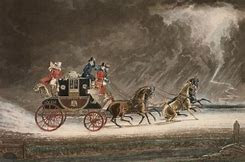
When I began writing Lies of Gold, I wanted to know more of the 18th and early 19th century marriage laws. I discovered women had very few rights. They belonged to their husbands and any property, money or income was therefore his. Leaving a marriage meant walking away with nothing and losing all rights to their children. If in his opinion she was unhinged or uncontrollable, he could legally have her committed to an asylum. This unpleasant fact was touched on in the Poldark TV series. Of course, our stories shouldn’t be gloom and doom, we can write the most endearing love stories, or the villain gets his just rewards in a drama, as long as it's believable.
My books Perilous Love and The Proposition are set in England and Europe during and after World War One. While researching and writing Perilous Love, I visited battlefields in Belgium and France. The carnage during that war was horrific, so many young men blown to pieces and unrecognisable. Today thousands of those war graves bear the inscription Known Only to God. I wondered if it was possible to steal a dead soldier’s identity disc. After all, their handwritten war service records stated their name, age, religion, birth place, marital status and general height/complexion. I contacted the Australian War Memorial and London’s Imperial War Museum asking if it was possible. They replied that it was indeed possible but did not confirm it had happened. That gave me the OK to begin The Proposition. Two men, similar in colouring and height meet on the eve of the huge Battle of Amiens. One is killed, the other falls wounded beside him. It’s a huge risk, a hanging offence and his only hope of a new life. He swaps identity discs.
The Proposition

Stealing a dead soldier's identity discs was Harry's only hope of a new life. He wasn't to know that new life would push him into blackmail and murder. To survive he must live this lie without a mistake, until Lacey and the truth.
Excerpt
Harry screamed as excruciating pain tore through his ears, then something slammed into him. He couldn’t hear, he couldn’t see, he couldn’t move. He was dead and the Man he didn’t believe in had despatched him to sinners’ hell. His throat convulsed and gagged on the dirt stuffed in his gaping mouth. Oh Christ, he was buried alive by the huge weight pressing down on him. His heart thumped with terror. Don’t move, don’t swallow, but his throat gagged again, and instinctively he coughed and spat. Frantic, he gasped and coughed again and felt cloth brushing against his face. He was lying on his outstretched arms. Hot tears filled his eyes. Very soon this little pocket of air would be gone, and he’ll die a slow death. No, think, think, push your hands forward. What if he was lying upside down? The earth beneath him shuddered and soil fell onto his head. The weight above him was shifting, just like the underground coal mines before they collapsed. More soil fell on his arms and the blackness above him turned grey. Scrabbling like a crab, he wriggled upwards and howled in agony when a savage pain sliced through his leg. Gasping and terrified of falling back, he pushed up further into the light. He had no idea where he was.
Dragging the precious air into his lungs, Harry lifted his head to a silent scene from hell. Black roots of trees pointed to the sky and thick smoke poured from huge craters gouged into the earth. Just like the books on the Apocalypse. It took many seconds before his eyes told his brain the craters were dark red and littered with dozens of bloodied, twisted bodies. Some stared up into nothing, some face down. Harry looked behind him and opened his mouth to scream but no sound came out. He’d been pinned beneath todies submerged in the crater still smoking from an exploded shell. The entrails of one body oozed into the bloodied soil and the other body, oh God. Harry’s stomach heaved, he was covered with blood and guts. Using his arms, he lurched forward, bit by bit over the churned earth towards the blackened tree stumps. The ground shook again making him cringe. In the distance, a thick pall of black smoke was covering the rows of men fighting furiously while shells pounded around them, but it was eerily silent. Like the films at the picture house without the words on the screen.
Harry struggled to his knees and almost fainted from the pain in his leg. Closing his eyes, he fell onto his side, breathing deeply, then reached down to feel the blood oozing through his trouser leg. He rolled onto his stomach.
“Come on, move, move.” He dragged himself forward until he came to a mound, but his strength failed. “Give up,” his mind screamed, then his eyes settled on a water canteen half buried in the earth. Pulling it out, he unscrewed the cap and drank. Nectar. Spitting the dirt out of his mouth he gulped the water greedily, feeling it flowing through his body and clearing his mind.
“Oh, Jesus.” The mound was a pile of bloodied bodies with sightless eyes. He couldn’t crawl over them. He couldn’t do it. Crying and wheezing with the pain in his leg he inched around them and looked back. The crater was barely thirty feet behind him. He had to stop. Why crawl to the trees? Stay here. Rest.
The throbbing in his leg forced Harry’s eyes open. If he could crawl to the little rise ahead of him, he’d stop there. Using his elbows to propel him, he inched forward and without warning, the earth gave way. Tumbling down the small slope he fell against a solid lump. A lump in uniform whose blank eyes stared directly into his. Jerking back, he clutched his head as excruciating pain tore through his ears. Moaning, he rocked back and forth until it eased and when he opened his eyes bile ran into his mouth.
Insects were taking up residence in the gaping, oozing chest cavity while the neck and chin, mouth and nose were strangely untouched. The scalp had gone. Harry turned away as his stomach heaved again. Move, move. Inching forward, his fingers touched a shiny object in the churned soil. He stared stupidly at the unscathed cigarette case.
“Oh no!” he turned back and leaned closer to read the name on the identity discs. Andrew Conroy, his service number and C E. The poor scared bastard with no family. He wanted to move away but his feeble strength failed. He’d rest here for a while. Holding the cigarette case with both hands, he lay back against the crumbled mound. He was so damn tired.
Voices, shouting. He forced his eyes open and everything tilted sideways. Blinking, he squinted at the hazy moving objects, oh yes, the Red Cross stretcher bearers and wagons were picking up the wounded before the ghastly task of removing the dead. Feeble, whimpering cries rose from the churned soil, arms outstretched from the wounded and barely alive pleading to be rescued from this bloodied, silent, wasteland.
Harry looked at the cigarette case in his hand and its owner lying next to him. It was a hanging offence. If he did, there would be no turning back. If he didn’t...
He had no strength; his fingers wouldn’t work. Do it, for Christ’s sake, do it. His chest wheezed, and his weak hands fumbled with the effort of pulling Andrew Conroy’s discs over the gaping skull. His arms ached with the mammoth task of removing his. When it was done, he lay beside the body. He wanted to say something, beg him to understand, but he couldn’t find the words.
A lump was in his throat. “Mate, you are in a better place.”His tears dripped onto the soil beside the body before he crawled away and lifted his arm.
Amazon • B&N• BooksWeLove
It occurred to me that what we do today will be our history tomorrow. Let’s hope the future generations doing their research will get it right!
Jan Selbourne
 I live in New South Wales, Australia. I grew up in Melbourne, (Victoria), and thank my parents and teachers for my love of history and books. After school and business college, I entered the dusty world of accounting, then aged 21 I joined the tide of Aussies travelling to the UK for a working holiday. There in front of me was the history I’d read about. I was hooked. Marriage and two children and career put my urge to write on hold, and now, finally retired, I’m able to devote the time to writing.Connect with Jan: Website• Facebook • Twitter.
I live in New South Wales, Australia. I grew up in Melbourne, (Victoria), and thank my parents and teachers for my love of history and books. After school and business college, I entered the dusty world of accounting, then aged 21 I joined the tide of Aussies travelling to the UK for a working holiday. There in front of me was the history I’d read about. I was hooked. Marriage and two children and career put my urge to write on hold, and now, finally retired, I’m able to devote the time to writing.Connect with Jan: Website• Facebook • Twitter.
Published on March 21, 2019 00:00
March 20, 2019
#BookReview — Reschen Valley: Season 1 - 1920-1924 - Box Set, by Chrystyna Lucyk-Berger #HistoricalFiction @ckalyna

Reschen Valley: Season 1 - 1920-1924 - Box SetBy Chrystyna Lucyk-Berger

She wants her home. He wants control. The Fascists want both.1920. Former Austrian Tyrol.When Katharina Thaler, a young Tyrolean farmer, finds a wounded Italian engineer in the mountains of the Reschen Valley, her decision to save his life thrusts both of them into a labyrinth of corruption, prejudice and greed.Angelo Grimani, a civil engineer, knows the details of a project that may destroy Katharina’s valley. Not in favour of it himself, he returns home to fend off the forces that envision the biggest reservoir in Italy, headed by Angelo’s own father.As the Tyroleans gear themselves to fight for their land, the Fascist party gathers power and momentum. Katharina and Angelo must each decide what to protect: love or country?Dive in and discover the gripping saga based on a history you never knew. This box set contains the first three of six books: No Man’s Land: Part 1, The Breach: Part 2, The Smuggler of Reschen Pass: The Prequel and bonus material including, From Jutta’s Kitchen: 12 South Tyrolean Recipes to bring the Reschen Valley series closer to home. Save now on the regular individual retail price!
 “They can take your land, they can take your weapons, but they cannot take the fight out of you…”
“They can take your land, they can take your weapons, but they cannot take the fight out of you…”When Italy had joined the Triple Entente, they had been promised much. However, such promises seemingly meant nothing when the Great Powers met at Versailles. Instead of the land they had been promised when they signed the secret Treaty of London, Italy would have to be content with the territory of Trentino and the Tyrol, a permanent seat on the League of Nations, and a massive debt to a nation they had rapidly lost all respect for. So much for their French and British allies and their promises. So much for America and their loans.
Captain Angelo Grimani knew all about the war. He had fought at the Battle of Marmolada under the command of a Colonel who was not fit to serve. Good men had died and for what? Greed? Power?
Katharina Thaler is as content as any woman could be after the end of a war which claimed so many lives. But now, on top of everything else, those in power had decided to annex Tyrol to Italy. Italian soldiers were now patrolling the newly attained border. Life, as Katharina had known it, would never be the same again.
When I was asked if I would like to review Reschen Valley: Season 1 - 1920-1924 - Box Set by Chrystyna Lucyk-Berger I jumped at the chance. The box set contains the first two books in the series as well as the prequel:
No Man’s LandThe BreachThe Smuggler of Reschen Pass: A Reschen Valley Prequel.
I am going to approach this review the same way I approached the box set — one book at a time!
No Man’s Land
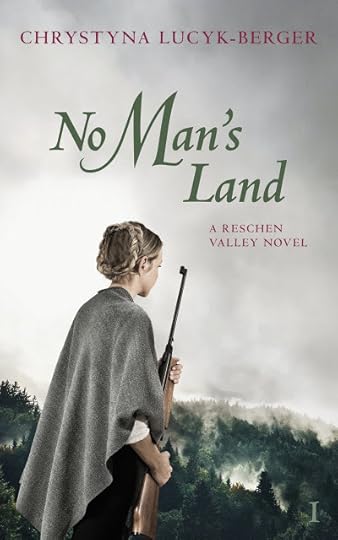
Italy is ready to embrace industry, but to do so, they need electricity. Their newly acquired land could hold the answer. As soon as the annexation has been signed off, they can start work on their planned dams.
Katharina Thaler lives in one of the proposed sites for a dam, but for now, she is oblivious to their plans, and besides, even if she did know, Katharina has more pressing issues to worry about. She is pregnant and the child‘s father has abandoned her.
Captain Angelo Grimani had been sent to the Reschen Valley to survey the land. However, while he was there, he was attacked. If it were not for Katharina, he would be dead. He likes Katharina, and in another time and place then maybe they could have… But that was just wishful thinking, for Angelo is married and his life is far away from Reschen.
No Man’s Land is a beautifully woven story about two very different people and a land that calls to them both for very different reasons.
Lucyk-Berger has not only created a very enthralling novel but one that is utterly engrossing. She has painted a vivid picture of a hard-up, but incredibly resilient community, in which she has placed her spirited heroine. Katharina is a character that I instantly adored. She is a strong-willed but passionate young woman who finds herself in a challenging situation. She risks everything for a forbidden love and on the face of it loses.
In comparison to the farming community of Reschen and Katharina, is the very sophisticated Italian Captain, Angelo Grimani. Angelo finds himself in the most terrible of situations — no matter what he does, he loses. He is faced with impossible choices. Angelo knows the difference between right and wrong, but sometimes there is a blur between the two. Angelo wants to see Italy become great. He is a very loyal citizen, and yet, he does not want to destroy long forged communities to see that change. At times I did not want to like him, but as Katharina found out, he is very hard to resist. He certainly isn’t the antagonist in this story, far from it. However, he does create problems for himself by trying to pacify everyone. His wife asks him to choose her side of the argument, his father ask the same, and he doesn’t know how to balance both of their desires with his own. It is no wonder that he discovered a moment of peace in Katharina’s arms.
Lucyk-Berger has created a very convincing historical backdrop for her characters and has set them up for what promises to be a must-read series.
The Breach
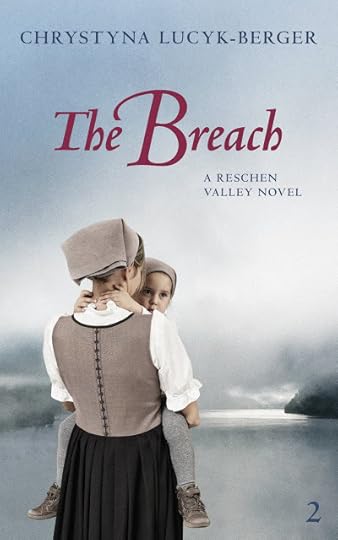
A great deal has changed in Katharina’s life. She is now a wife and a mother. Her husband, Florian, has never asked who the father of her daughter is. Instead, he has accepted her daughter as his own. No one must know the truth. Ever.
Angelo Grimani has a recurring dream in which a dam, of his making, bursts in the Reschen Valley, fooding everything and taking something very precious away from him. Only, he does not know what it is that has been taken. Not that it matters. It is just a dream. And besides, there are more important things to think about. As Italy becomes more and more enchanted with Benito Mussolini and his promises, Angelo must make a decision. Will he stand with his father and the Partito Nazionale Fascista or will he stand with his wife and the people of Tyroleans.
The Breach is one of the most enthralling historical fiction stories that I have ever read.
Taking up where the No Man’s Land had left off, Chrystyna Lucyk-Berger has penned a book not only vibrant in its narrative but also one that is rich with authentic historical details. Lucyk-Berger’s compelling style pulls you right into the story from the first sentence and does not let go of you until the last full stop.
I did not pause for breath between finishing No Man’s Land and starting The Breach. I was desperate to know what was going to happen next. I am pleased to say I was not disappointed. This book had everything I desired and then some. Lucyk-Berger has lavishly evoked the land that she has set her story in. The rise of fascism in Italy during this era has been painstakingly researched and alongside some very appealing characters, made this book impossible to put down.
Although our wonderful protagonists do not meet again in this book, they are very much in each other’s thoughts. I really felt for Angelo, and although some things he does are deplorable, he is still an incredibly likeable character. He makes mistakes, and yet he learns from them, at least, he seems to. His relationship with Signora Gina Conti added an exciting twist to the story! It certainly complicated his life even more than it already was.
There are some fascinating supporting characters in this book as there was in No Man's Land. Jutta Hanning and her son stole my heart. She is a single woman who is dedicated to her child and the inn that she runs. When everything, at last, seems to be going the right way for Jutta, fate then deals her a horrible hand. She is a very brave and courageous woman, whom I could not help but admire. Another supporting character that I adored is Katharina’s husband, Florian. He is such a lovely man, Katharina could not wish for a kinder more loving husband. He is incredibly patient with her, and even though he is longing for her to confide in him about the father of her daughter he does not press her for information. However, it is hard for him to compete with someone he doesn’t even know the name of.
I thought The Breach was really rather marvellous. Wonderfully addictive. Lucyk-Berger is a born storyteller.
The Smuggler of Reschen Pass: A Reschen Valley Prequel
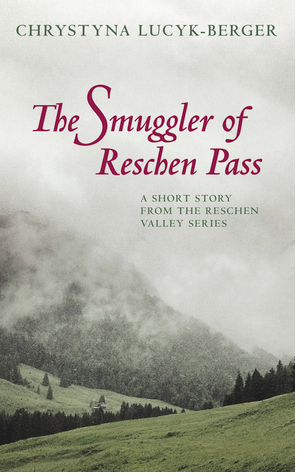
Fritz Hanny has friends, money, and a future. Marrying Cecilia, a young woman from the neighbouring village, would make his life complete. However, Cecilia’s father has other plans for his daughter that does not involve Fritz. Fritz is not the type of person to give up, but one drunken night changes the course of his life forever. Now he has a wife who does not love him and a child who is disabled. Life has become a bitter disappointment.
I was really looking forward to finding out the backstory to Jutta. The Smuggler of Reschen Pass: A Reschen Valley Prequel was a magnificent addition to the series.
Lucyk-Berger has a masterful style the pulls you right into the heart of the story. I thought this novella was brilliantly executed. Fritz Hanny is not the most likeable of characters. He does some truly terrible things, especially to Jutta, and I loathed him for that.
Lucyk-Berger has explored the darker side of human nature in this tale, and she has done so with great skill and splendour. This story appalled, impressed, and fascinated in equal measures. It is wonderfully told and impossible to put down.
If you are looking for your next historical fiction series, then do not pass by Reschen Valley: Season 1 - 1920-1924 - Box Set by Chrystyna Lucyk-Berger. This is a fantastic series. A real gem.
I Highly Recommend.
Review by Mary Anne Yarde.The Coffee Pot Book Club.
Pick up your copy today!Amazon UK • Amazon US
Chrystyna Lucyk-Berger
 Chrystyna Lucyk-Berger is an American author living in Austria. Her focus is on historical fiction now. She has been a managing editor for a publishing house, has worked as an editor, and has one several awards for her travel narrative, flash fiction and short stories. She lives with her husband in a “Grizzly Adams” hut in the Alps, just as she’d always dreamed she would when she was a child.
Chrystyna Lucyk-Berger is an American author living in Austria. Her focus is on historical fiction now. She has been a managing editor for a publishing house, has worked as an editor, and has one several awards for her travel narrative, flash fiction and short stories. She lives with her husband in a “Grizzly Adams” hut in the Alps, just as she’d always dreamed she would when she was a child.Connect with Chrystyna: Website • Facebook • Twitter.
Published on March 20, 2019 22:30
A conversation with Historical Western Romance author, Kristine Raymond #amwriting #HistoricalRomance #WesternRomance @k_raymondauthor
Published on March 20, 2019 00:00
March 19, 2019
How would you like to learn how to market your book for FREE? Sign up to these fabulous FREE marketing courses. What are you waiting for? Start learning today... #amwriting #ampromoting #Books
Book Marketing Courses for
Authors With Books Go Social

So, you have published your book. Congratulations! Now what?
Having some knowledge about Book Marketing is essential if your book is going to be successful. I am delighted to have negotiated this wonderful, not to be missed offer from Books Go Social.
For a Limited Time, you can access their training courses for FREE! That’s right, I said for FREE!
The Courses:
• Fast Track Master Class In Finishing Your Novel — Usual Price $99.00
• Master Class In Story Telling — Usual Price $39.00
• Fast Track Master Class In Blogging For Authors —Usual Price $99.00
• Fast Track Basics of Digital Marketing For Authors – Usual Price $0.00
• Fast Track Master Class In Viral Marketing For Authors — Usual Price $99.00
• Fast Track Master Class In Email Marketing — Usual Price $99.00
• Master Class In Creating Podcasts That Sell Books — Usual Price $99.00
• Fast Track Master Class In Achieving Your Dream — Usual Price $99.00
• *The Digital Marketing Power Pack For Authors — Usual Price $199.00*The Coffee Pot Book Club Highly Recommended Marketing Course.
• Fast Track Master Class In Twitter For Authors — Usual Price $99.00
• Fast Track Master Class In Facebook For Authors — Usual Price $99.00
• Master Class In Power Branding For Authors — Usual Price $99.00
• Master Class In Public Relations For Authors — Usual Price $99.00
• Master Class In Remembering All That You Learn — Usual Price $12.50
To view the courses in more detail click
HERE!
Once you have chosen the course you would like to do type in
hf1
at the checkout.
Who are Books Go Social?

Books Go Social (BGS) is a highly respected Author Promotion service — you may have already heard of them. The founder of BGS, Laurence O’ Bryan is dedicated to helping authors showcase their books. He knows what works and what does not. This is why I am so excited to be working with him on this fantastic deal.
Recommended by

Published on March 19, 2019 23:00
'I'm going to write my war novel...' by Beryl Kingston #amwriting #HistoricalFiction @berylkingston
'I'm going to write my war novel...'By Beryl Kingston…says the young writer in her twenties or thirties. And I hear what she says and cringe, because I know from having read, or dipped into, quite a lot of 'my war novels' that, even if it's competently written, ten to one it will disappoint me. And the reasons for my disappointment are always the same. It is because the writers present their characters as though they are living in the 21st Century. They speak in the same way as we do now, think in the same way and act in the same way, our thoughts, speech and actions being very closely linked. I don't correct any of them because I can see what a lot of work has gone into their creation but it upsets me because it belittles the courage of most ordinary people who were involved in the horrors of the Second World War - and the four year carnage of WW1.
In the late 30s. When the members of the newly emerging ARP were being prepared and trained for the jobs they all knew they would soon be doing when the air raids began, they were given clear instructions. 'Always stay calm,' was the first and most important. 'No matter what you are seeing or what you might be feeling, don't let your casualties know it. Tell them 'We're here. We've got you. You're going to be all right.' If you cry or panic you will put them into even deeper shock than they're in already. Stay calm.'
And through the ten terrible months of the London Blitz and the bombing of ports and cities all over the country, and all through the attacks by doodle-bugs and rockets, that's what they did. I saw it at first hand.

Let me tell you a true story about what the war was really like. I found it in the Mass Observation diaries, the first-hand day-to-day accounts that ordinary people kept all through the war and sent to the Mass Observation team, and it was written by a young woman in the ARP. She had been on duty all night long rescuing people from the wreckage of their homes and shelters, as the bombs continued to fall and she was cycling home 'feeling very tired' when she was hailed by a rescue team who were still working on yet another bomb site. They told her she would do because she was skinny. They explained that they had an injured man at the bottom of a pit. They'd managed to dig down to him but they couldn't get him out until the heavy lifting gear arrived or they would bring the rest of house down on top of him, and he was in pain and needed morphine. Would she go down to him?
She stripped off her uniform so that it would be easier to squeeze down and was lowered into the stink, darkness and danger of the pit. When she reached the bottom she found that the man was horribly injured. Most of his face had been blown away. There were black holes where his eyes, nose and lips had been and he was plainly in agony. 'But,' she reported, 'I remembered my training and kept calm. I told him he was going to be all right and that we would get him out and I gave him the morphine.' She stayed with him until the drug had taken effect and the heavy lifting gear had arrived and then she was hauled out. She wrote about it so calmly, it made me weep. 'I put my clothes on,' she wrote. 'Then I was sick.' I'll bet she was. 'Then I went home.'
Now that's courage and compassion of a very high order and that's how most people were. I hope when my 30th book is published later this year, my readers will find it equally revealing and honest. It is called 'Citizen Armies', and is about a Warden, an Ambulance Driver and their two daughters who are nurses. It starts on the day the war was declared and is written from diaries I kept at the time, so the speech, thoughts and actions are as accurate as I could get them. Respec', fellow citizens! I honour you.
I'm going to end this blog with a poem I wrote more than half a lifetime ago, because it shows how our language changed when we were at war and what it was like to spend our nights in the cellar waiting for a bomb to fall on us.
Under Fire
My childhood stopped abruptly when I was nine
Bitten off by war, in whose foul maw
My generation lost our innocence.
Everything changed after the first blitz.
The days descended into dark and dust,
Clogged with alerting, soon-familiar smells.
Old brick, damp wood, escaping gas and shit.
Even our words were changed.
Scrimping became a virtue, light a crime,
Food became "rations", fire "incendiaries",
Bombing, an "incident" producing "casualties"
We needed euphemism to deflect
Too much, too sudden, raw reality.
A "raid" could sound quite thrilling
"Down in the drink" disguised a sea-killing
"Missing" postponed the mallet shock of "dead".
The sirens' fear-inducing wail
In the first frightened week could drain us pale,
But by the third alarm we'd learned to counter panic by routine.
Boots on your feet and blanket on your arm
Down to the cellar, in a coal-damp dream, settle the baby, find the cat, pour tea
Thread grandma's darning needle, make a bed.
Ignore the laboured droning overhead, the enemy above us in the air.
Under the stair and crouched by coal,
We heard another reassuring sound
Of night trains rumbling in the Underground.
And meters gave their old familiar cluck,
Though every shift disturbed the dust, which stuck
Like black snow on the cards we held and played, to show we weren't afraid.The ear-high light bulb flicked and flickered and swayed
To the rhythmic thump of railway line ack-ack
And we were all together in that foetid black,
Our nightly vigil staunchly automatic.
The adults round me, stolid and phlegmatic
Revealed the value of control and calm,
That cowardly hysteria does the most harm
And should be feared and shunned, and rightly hated,
That bravery is quiet and under-rated
And constantly contained,
That the responsible are self-restrained.
We learned that terror carries you past grace,
Past hope, past fear, past feeling to a space
Beyond sensation.Learned too, no matter how you pray or cry,
That "if your number's on it", you will die.
Our resignation was a comfort to me in our cellared nights
And holds and guides me still,
Do what I will.
Everybody’s Somebody
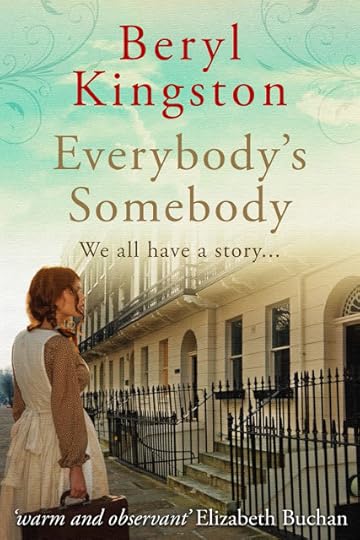
"Life’s for real an’ you got to get on with it."
Rosie Goodison is not one to shy away from life’s problems. Whether it’s finding work or challenging injustice, Rosie squares her shoulders, sets her chin high and faces it full on.
Born at the end of the nineteenth century, in the rural south of England and sent into service aged just twelve, Rosie quickly discovers that many good people spend their lives toiling for very little reward, whilst others ‘have it all’.
She decides it won’t be like that for her. Why can’t she ride in a car? Why can’t she work when she’s pregnant? Why can’t she live in a nice flat? Why can’t she be an artist’s model?
Whilst working as a housekeeper for two upper-class boys, Rosie starts to learn more and more about the world, gleaned from overheard conversations and newspapers left lying around. This triggers an ongoing thirst for knowledge, which shapes her views, informs her decisions and influences her future.
Rosie aspires to have a better life than that of her parents: better living conditions, better working conditions and pay, better education for her children, to be able to vote, to be able to control how many children she has…
Without realising it, this young woman is blazing a trail for all those who are to come after.
Whilst working in London, Rosie meets her sweetheart Jim, but the The Great War puts paid to their plans for the future, and matters worsen afterwards, as she, along with the rest of society, tries to deal with the horrors and losses.
This heart-warming story follows the events of the early twentieth century – the impact and horrors of WW1, the financial crisis and the rapid social and political changes that took place.
All that remains of Rosie now is a quartet of paintings in an art gallery. The artist, now famous but the model, unnamed and forgotten; nobody of consequence.
But everybody has a life story. Everybody leaves some kind of mark on this world.
Everybody’s somebody.
Citizen ArmyFollow the characters in Everybody’s Somebody through WW2 and up to the bloodless revolution of 1945.Coming soon…
Beryl Kingston
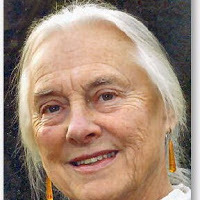 It sounds immodest to say so, but I am a prolific bestselling author. My first book was published in 1985 and was an instant bestseller. From then on I wrote a best seller every year for the next 14 years. Some of my novels are family sagas like Hearts and Farthings and its sequel Kisses and Ha’pennies, some are modern stories like Laura’s Way and Maggie’s Boy, some are historical novels set in the 20th ,19th, or 18th century, some are war stories like A Time to Love and Avalanche of Daisies which feature WW1 and WW2.
It sounds immodest to say so, but I am a prolific bestselling author. My first book was published in 1985 and was an instant bestseller. From then on I wrote a best seller every year for the next 14 years. Some of my novels are family sagas like Hearts and Farthings and its sequel Kisses and Ha’pennies, some are modern stories like Laura’s Way and Maggie’s Boy, some are historical novels set in the 20th ,19th, or 18th century, some are war stories like A Time to Love and Avalanche of Daisies which feature WW1 and WW2. I reached the top payment level for public lending right with my 4th book and passed the million mark in sales with book number 12. I am now 86, pushing 87 and writing my 30th novel.
I have also written plays for the children I taught during a long teaching career, stories for various magazines and a novella about a conceited cat. Bloomsbury reader and Endeavour Press are currently reissuing my back-list on various e-book sites including Kindle.
I was the winner of the 2014 Blake Society Tithe Grant Award.
I was married for 54 years, had three children and five grandchildren and now has eight great-grandchildren, with another one on the way, and they are the apples of my eye.
Connect with Beryl: Website • Twitter • Facebook.
Published on March 19, 2019 00:00
March 18, 2019
Find out why historian, Sharon Bennett Connolly, thinks Matilda of Flanders is the ideal Medieval Queen #Medieval #History #Normans @Thehistorybits
Matilda of Flanders:
the Ideal Medieval Queen
By Sharon Bennett Connolly
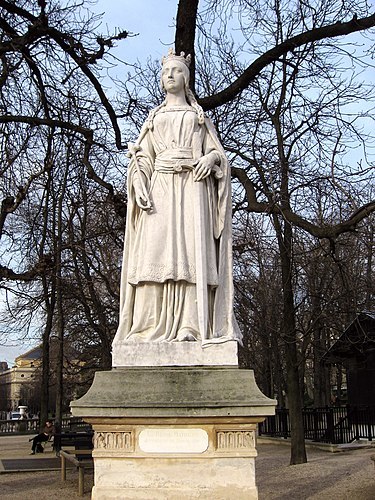
Matilda of Flanders was the consummate duchess and queen. Born in the early to mid-1030s, possibly around 1032, Matilda was the daughter of Baldwin V, Count of Flanders, and his wife Adela of France, herself a daughter of Robert the Pious, King of France. Matilda had two brothers and each of them became Count of Flanders in his turn; Baldwin of Mons and Robert the Frisian. As is often the case with medieval women, we know very little of Matilda’s early life, though it is likely she was raised alongside her aunt, Judith, her father’s sister who was of a similar age to Matilda, and who would go on to marry Tostig, Earl of Nurthumberland and brother of king Harold II.
The first time Matilda appears on the world stage is when her marriage is being discussed. There is a popular story of how Matilda refused to marry William, Duke of Normandy, stating that she was too highly born to marry a bastard. As the story goes; on hearing this, William was so infuriated that he rode to Flanders and confronted Matilda. He is said to have thrown her to the ground, before pulling her braids and cutting her with his spurs. Matilda, unlikely as it seems, then accepted his proposal and they were married. Despite the story, most likely, being a later invention, William was the one to propose the marriage and, although he was a duke, his illegitimacy would have meant making a proposal to a niece of the King of France was audacious, to say the least.
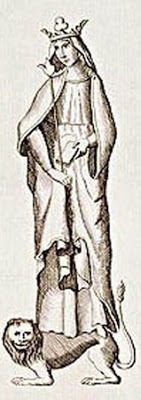 The arrangements for the marriage of Matilda and William probably started in 1048, but it was a long, drawn out matter, marred by papal and political machinations. The Synod of Reims, of 3 and 4 October 1049, issued a decree instructing Count Baldwin not to allow the marriage of his daughter to Duke William. However, despite these papal objections, Matilda and William were married by 1053, at the latest. A penance was imposed on the couple for their disobedience in marrying against papal prohibition. Each was to found an abbey; William founded the Abbaye-aux-Hommes, or St Stephen’s Abbey, in his Norman capital of Caen, while Matilda founded the Abbaye-aux-Dames, or Holy Trinity Abbey, in the same city. The two abbeys still stand to this day.
The arrangements for the marriage of Matilda and William probably started in 1048, but it was a long, drawn out matter, marred by papal and political machinations. The Synod of Reims, of 3 and 4 October 1049, issued a decree instructing Count Baldwin not to allow the marriage of his daughter to Duke William. However, despite these papal objections, Matilda and William were married by 1053, at the latest. A penance was imposed on the couple for their disobedience in marrying against papal prohibition. Each was to found an abbey; William founded the Abbaye-aux-Hommes, or St Stephen’s Abbey, in his Norman capital of Caen, while Matilda founded the Abbaye-aux-Dames, or Holy Trinity Abbey, in the same city. The two abbeys still stand to this day. The marriage between Matilda and William proved to be a strong and trusting relationship; William is one of very few medieval kings believed to have been completely faithful to his wife, no known lovers or illegitimate children have ever been uncovered, although that did not stop the rumours. William of Malmesbury related one such story, of William having a mistress, the daughter of a priest, who Matilda ordered to be hamstrung and disinherited; in punishment, Matilda is said to have been beaten to death by a horse bridle. Malmesbury himself was sceptical of the story and, given that Matilda’s death came after a short illness in 1083, it does seem rather far-fetched.
William trusted Matilda to act as regent in Normandy during his many absences on campaign or in England. Their relationship was more of a partnership than most medieval marriages; she was witness to thirty-nine pre-conquest and sixty-one post-conquest charters. Matilda supported her husband’s proposed invasion of England; she promised a great ship for William’s personal use, called the Mora. Just before leaving for England in 1066, William accompanied Matilda to the consecration of her foundation, Holy Trinity Abbey – the Abbaye-aux-Dames – in Caen, arranging for his duchess to act as regent in his absence. The Conquest was a close-run thing and it was not until 1068 that William felt secure enough to bring his wife to England for her coronation. Matilda, six months pregnant with her son Henry, who would be born in September, was crowned Queen of England in Westminster Abbey, by Archbishop Ealdred of Canterbury, at Whitsuntide 1068.
Matilda and William had a large family, with four boys and at least four daughters. Of their sons; the eldest, Robert Curthose, would inherit Normandy, Richard was killed in a hunting accident as a youth, William, known as Rufus, became King William II, and the youngest was the future Henry I. Of the four or five daughters; Adeliza became a nun following a series of failed marriage plans, Cecilia was given to the convent of Ste Trinité as a child, Constance married Alain Fergant, Duke of Brittany, and Adela married Stephen of Blois and was the mother of King Stephen of England. There are suggestions of two further daughters, Matilda and Agatha, though evidence for their existence is limited. Queen Matilda was very close to her family, especially her eldest son, Robert. William and Robert, father and son, however, were often at loggerheads, with Robert rebelling against his father as a young man. Matilda was constantly trying to play the peacemaker. During a period of exile imposed on Robert, Matilda still supported her son as best she could; she would send him vast amounts of silver and gold through a Breton messenger, Samson.
Although the problems with Robert, their eldest son, caused considerable tensions within the marriage, Matilda and William’s relationship is one of the most successful of the medieval period. Their partnership as rulers, and as husband and wife, was strong and appeared to be one built on mutual respect. One contemporary remarked that ‘The Queen adored the King and the King the Queen.’ [1]
Matilda’s piety was renowned. Although founding the Abbaye aux Dames in Caen was a penance for her irregular marriage to William, her constant and repeated donations to religious houses demonstrate her dedication to her faith. The nuns of her abbey at Ste Trinité, Caen, received a substantial bequest from Matilda’s will, written the year before her death; as well as her crown and sceptre, they were given a chalice, a chasuble, a mantle of brocade, two golden chains with a cross, a chain decorated with emblems for hanging a lamp in front of the altar, several large candelabras, the draperies for her horse and all the vases ‘which she had not yet handed out during her life’. [2]
 Having drawn up her will in 1082, it is possible that Matilda was aware of her illness long before her last summer. The continuing worry over the rift between her husband and beloved son cannot have helped her health, and the arrival of winter saw her gravely ill. Matilda died on 2 November 1083, having ‘confessed her sins with bitter tears and, after fully accomplishing all that Christian custom requires and being fortified by the saving sacrament’. [3] Her husband was with her throughout the final moments of her illness, and he ‘… showed many days of the deepest mourning how much he missed the love of her whom he had lost’. [4] She was buried at Ste Trinité, Caen, following a funeral that lasted two days and that was attended by a host of monks, abbots, bishops and nuns and a host of people came to pay homage. There is no record of which of her children attended the funeral, although her daughter Cecilia was most likely in attendance, being a nun of the abbey. The original tombstone still survives; it has an inscription carved around the edge, emphasising her royal descent on her mother’s side.
Having drawn up her will in 1082, it is possible that Matilda was aware of her illness long before her last summer. The continuing worry over the rift between her husband and beloved son cannot have helped her health, and the arrival of winter saw her gravely ill. Matilda died on 2 November 1083, having ‘confessed her sins with bitter tears and, after fully accomplishing all that Christian custom requires and being fortified by the saving sacrament’. [3] Her husband was with her throughout the final moments of her illness, and he ‘… showed many days of the deepest mourning how much he missed the love of her whom he had lost’. [4] She was buried at Ste Trinité, Caen, following a funeral that lasted two days and that was attended by a host of monks, abbots, bishops and nuns and a host of people came to pay homage. There is no record of which of her children attended the funeral, although her daughter Cecilia was most likely in attendance, being a nun of the abbey. The original tombstone still survives; it has an inscription carved around the edge, emphasising her royal descent on her mother’s side. Matilda’s height has been discussed frequently by historians, with some claiming that she was a dwarf. The casket, containing her bones, was opened in 1961 and misreported as revealing a woman of about 4ft 2in tall. However, Professor Dastague, from the Institut D’Anthropologie at Caen, who was present at the original dig confirmed that it had been calculated that Matilda was in fact 152cm, about 5ft, in height. [5] Matilda’s actual height cannot be said with certainty, however, as the skeleton which was examined was incomplete. The queen’s grave had been destroyed in the sixteenth century, during the French Wars of Religion, and much of her remains never recovered.
William the Conqueror followed his wife to the grave four years later, in 1087. In many aspects of her life, Matilda is clearly seen as the ideal medieval wife and mother. Ever supportive of her husband, he relied heavily on her to administer Normandy in his frequent absences. Even when disobeying William, in her support of their eldest son Robert, she was still trying to be the embodiment of the good medieval woman, playing the peacemaker between warring members of her family. Her piety and steadfast support of her husband provided an example for future queens, and noble ladies, to follow.
Heroines of the Medieval World
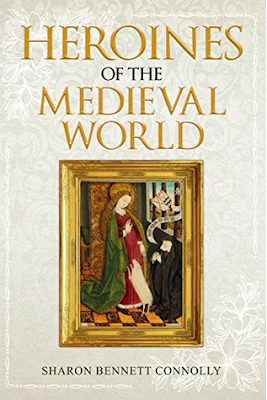 These are the stories of women, famous, infamous and unknown, who shaped the course of medieval history. The lives and actions of medieval women were restricted by the men who ruled the homes, countries and world they lived in. It was men who fought wars, made laws and dictated religious doctrine. It was men who were taught to read, trained to rule and expected to fight. Today, it is easy to think that all women from this era were downtrodden, retiring and obedient housewives, whose sole purpose was to give birth to children (preferably boys) and serve their husbands. Heroines of the Medieval World looks at the lives of the women who broke the mould: those who defied social norms and made their own future, consequently changing lives, society and even the course of history.
These are the stories of women, famous, infamous and unknown, who shaped the course of medieval history. The lives and actions of medieval women were restricted by the men who ruled the homes, countries and world they lived in. It was men who fought wars, made laws and dictated religious doctrine. It was men who were taught to read, trained to rule and expected to fight. Today, it is easy to think that all women from this era were downtrodden, retiring and obedient housewives, whose sole purpose was to give birth to children (preferably boys) and serve their husbands. Heroines of the Medieval World looks at the lives of the women who broke the mould: those who defied social norms and made their own future, consequently changing lives, society and even the course of history. Some of the women are famous, such as Eleanor of Aquitaine, who was not only a duchess in her own right but also Queen Consort of France through her first marriage and Queen Consort of England through her second, in addition to being a crusader and a rebel. Then there are the more obscure but no less remarkable figures such as Nicholaa de la Haye, who defended Lincoln Castle in the name of King John, and Maud de Braose, who spoke out against the same king’s excesses and whose death (or murder) was the inspiration for a clause in Magna Carta.
Women had to walk a fine line in the Middle Ages, but many learned to survive – even flourish – in this male-dominated world. Some led armies, while others made their influence felt in more subtle ways, but all made a contribution to their era and should be remembered for daring to defy and lead in a world that demanded they obey and follow.
Amazon UK • Amazon US
Silk and the Sword:
the Women of the Norman Conquest
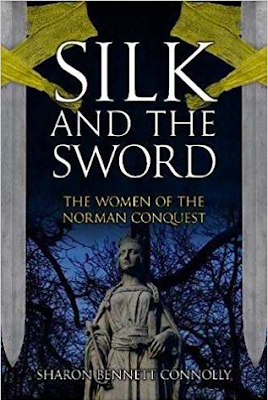 Everyone knows about the events of 1066; the story of invasion and conquest. But what of the women? Harold II of England had been with Edith Swan-neck for twenty years but in 1066, in order to strengthen his hold on the throne, he married Ealdgyth, sister of two earls. William of Normandy's duchess, Matilda of Flanders had, supposedly, only agreed to marry the Duke after he'd pulled her pigtails and thrown her in the mud. Harald Hardrada had two wives - apparently at the same time. So, who were these women? What was their real story? And what happened to them after 1066? From Emma of Normandy, wife of both King Cnut and Aethelred II to Saint Margaret, a descendant of Alfred the Great himself, 'Silk and the Sword' traces the fortunes of the women who had a significant role to play in the momentous events of 1066.
Everyone knows about the events of 1066; the story of invasion and conquest. But what of the women? Harold II of England had been with Edith Swan-neck for twenty years but in 1066, in order to strengthen his hold on the throne, he married Ealdgyth, sister of two earls. William of Normandy's duchess, Matilda of Flanders had, supposedly, only agreed to marry the Duke after he'd pulled her pigtails and thrown her in the mud. Harald Hardrada had two wives - apparently at the same time. So, who were these women? What was their real story? And what happened to them after 1066? From Emma of Normandy, wife of both King Cnut and Aethelred II to Saint Margaret, a descendant of Alfred the Great himself, 'Silk and the Sword' traces the fortunes of the women who had a significant role to play in the momentous events of 1066.Amazon UK • Amazon US
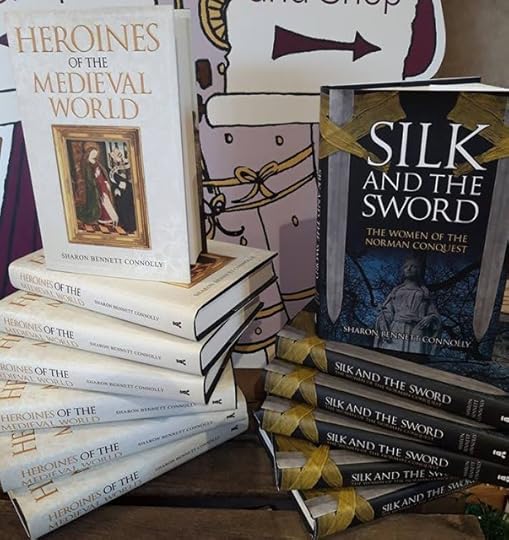
Sharon Bennett Connolly
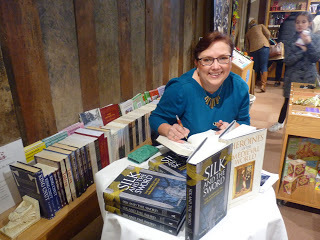 Sharon Bennett Connolly writes the popular blog, History … the Interesting Bits, and has written two non-fiction books. Her debut book,
Heroines
of the Medieval World
, telling the stories of some of the most incredible women from Medieval history, was released in September 2017 and will be out in paperback in the UK from 15 March 2019 and in the US on 1 June 2019. It is available for pre-order from both Amazon UK and Amazon US. Sharon’s second book,
Silk and the Sword: the Women of the Norman Conquest
, tracing the fortunes of the women who had a significant role to play in the momentous events of 1066, was released in the UK in November 2018 and is available from Amazon UK. It is scheduled for release in the US on 1 March 2019 and isavailable for pre-order from Amazon US.
Sharon Bennett Connolly writes the popular blog, History … the Interesting Bits, and has written two non-fiction books. Her debut book,
Heroines
of the Medieval World
, telling the stories of some of the most incredible women from Medieval history, was released in September 2017 and will be out in paperback in the UK from 15 March 2019 and in the US on 1 June 2019. It is available for pre-order from both Amazon UK and Amazon US. Sharon’s second book,
Silk and the Sword: the Women of the Norman Conquest
, tracing the fortunes of the women who had a significant role to play in the momentous events of 1066, was released in the UK in November 2018 and is available from Amazon UK. It is scheduled for release in the US on 1 March 2019 and isavailable for pre-order from Amazon US. Footnotes: [1] Les Oeuvres Poétiques de Baudri de Bourgueil edited by P. Abrahams; [2] Musset, La Reine Mathilde, quoted by Elizabeth van Houts in oxforddnb.com. [3] Matilda by Tracy Borman, [4] Chronicles of the Kings of England, From the Earliest Period to the Reign of King Stephen by William of Malmesbury; [5] A Historical Obstetric Enigma: How Tall was Matilda? (article) by J Dewhurst Journal of Obstetriccs and Gynaecology.
Bibliography: England Under the Norman and Angevin Kings by Robert Bartlett; Heroines of the Medieval World by Sharon Bennett Connolly; Chronicles of the Kings of England, From the Earliest Period to the Reign of King Stephen by William of Malmesbury; Silk and the Sword: The Women of the Norman Conquest by Sharon Bennett Connolly; Brewer’s British Royalty by David Williamson; Britain’s Royal Families, the Complete Genealogy by Alison Weir; Matilda by Tracy Borman; The Norman Conquest by Marc Morris; The Anglo-Saxon Chronicles by Michael Swanton; The Anglo-Saxon Chronicle by James Ingram; The Mammoth Book of British Kings and Queens by Mike Ashley; oxforddnb.com; Queen Matilda, wife of William the Conqueror, was NOT a Dwarf (article) by Marc Morris, marcmorris.org.uk; epistolae.ccnmtl.columbia.edu; womenshistory.about.com; Les Oeuvres Poétiques de Baudri de Bourgueil edited by P. Abrahams
Published on March 18, 2019 00:00
March 16, 2019
#BookReview — Children of the Chieftain: Bound for Home, by Michael E Wills #ChildrenBooks #HistoricalFiction #Vikings
 Children of the Chieftain: Bound for HomeBy Michael E Wills
Children of the Chieftain: Bound for HomeBy Michael E Wills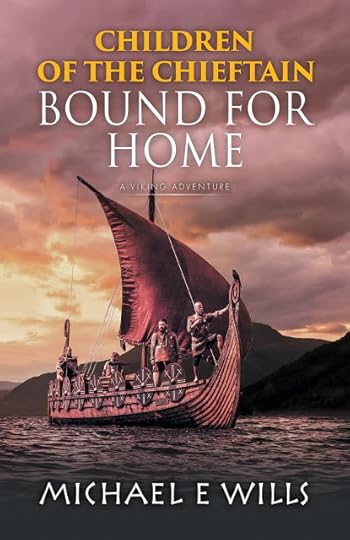
After three years in the service of the emperor of the Greeks, Ahl and his Viking friends have become very rich. Now the crew longs to return home with their wealth, their problem is that the emperor will not permit them to leave. They make a daring plan to escape. The route home is perilous as they navigate uncharted seas. They must overcome robbers, storms and hostile strangers as they seek their way back to the Northlands with the riches which they have earned.

“Man the oars,” shouted Ahl. “We are bound for home.”
The Varangians have been in the service of the emperor of the Greeks for three years, and in that time they have earned a fortune. But the men are restless and they want to take their treasure and return to the colder climate of their homeland. Alas, the Greeks are reluctant to part with their Varangian allies. Ahl, the leader of the Varangian’s, has come up with a way to escape the hold of their Greek masters. It will be dangerous, and if they fail, they may well end up as slaves, but it is a risk worth taking. Nothing was going to stop the Varangians from going home — not even a Greek galley.
From the heat of the Mediterranean sun to the dangers of the open sea, Children of the Chieftain: Bound for Home, by Michael E Wills is a wonderfully engaging historical fiction story for children.
Children of the Chieftain: Bound For home begins with a delightful narrative hook, which draws the reader into the world of Ahl and his men. Wills’ keeps the language of the story simple for his younger audience, and he is careful not to overload his readers with large paragraphs of descriptive text. Instead, Wills gives just enough detail to set the scene and lets the narration of his characters drive the story forward. I thought this worked very well, and it is sure to keep the attention of his intended audience.
The journey the characters go on is fraught with danger, especially in the open sea, but Wills does not make the story too frightening. Wills mindfulness of his audience is apparent throughout this book. Wills does touch on the conflicting religious beliefs of the time, but again, he is very sensitive in his approach to this.
I thought this book was a fabulous introduction to historical fiction for a younger audience. It is just the right length for even the most reluctant readers, but rich enough in the story for those children who like to lose themselves in a good book.
I Highly Recommend.
Review by Mary Anne Yarde.
The Coffee Pot Book Club.
Purchase your copy ofChildren of the Chieftain: Bound for Home
Amazon UK • Amazon US
Michael E. Wills
 Michael E. Wills was born on the Isle of Wight, UK, and educated at the Priory Boys School and Carisbrooke Grammar. He trained as a teacher at St Peter’s College, Saltley, Birmingham, before working at a secondary school in Kent for two years.
Michael E. Wills was born on the Isle of Wight, UK, and educated at the Priory Boys School and Carisbrooke Grammar. He trained as a teacher at St Peter’s College, Saltley, Birmingham, before working at a secondary school in Kent for two years.After re-training to become a teacher of English as a Foreign Language he worked in Sweden for thirteen years. During this period, he wrote several English language teaching books. His teaching career has included time working in rural Sweden, a period that first sparked his now enduring interest in Scandinavian history and culture - an interest that after many years of research, both academic and in the field, led him to write “Finn’s Fate” and the sequel novel, “Three Kings – One Throne”. Continuing in a Viking theme, in June 2015, Michael published, “Children of the Chieftain: Betrayed”, the first of a quartet of Viking adventure stories for young readers. The book was described by the Historical Novel Society reviewer as “An absolutely excellent novel which I could not put down.” The novel was long-listed for the Historical Novel Society, 2016 Indie Prize. The second book in the quartet, “Children of the Chieftain: Banished”, was published in December 2015 followed by the third book, “Children of the Chieftain: Bounty”, which was published in 2017. The fourth and final book in the quartet. “Children of the Chieftain: Bound for Home”, has just been published.
Today, Michael works part-time as Ombudsman for English UK, the national association of English language providers. Though a lot of his spare time is spent with grandchildren, he also has a wide range of interests including researching for future books, writing, playing the guitar, carpentry and electronics.
You can find out more about Michael and the books he has written by visiting his website: www.michaelwills.eu
Published on March 16, 2019 00:00
The Coffee Pot Book Club
The Coffee Pot Book Club (formally Myths, Legends, Books, and Coffee Pots) was founded in 2015. Our goal was to create a platform that would help Historical Fiction, Historical Romance and Historical
The Coffee Pot Book Club (formally Myths, Legends, Books, and Coffee Pots) was founded in 2015. Our goal was to create a platform that would help Historical Fiction, Historical Romance and Historical Fantasy authors promote their books and find that sometimes elusive audience. The Coffee Pot Book Club soon became the place for readers to meet new authors (both traditionally published and independently) and discover their fabulous books.
...more
...more
- Mary Anne Yarde's profile
- 159 followers



